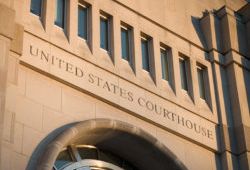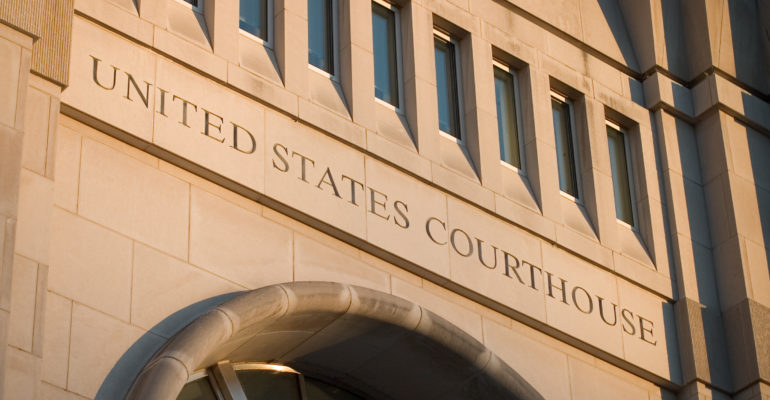 In a precedential decision last week, the U.S. Court of Appeals for the Federal Circuit held that the use of IPR proceedings for patents issued prior to the enactment of the America Invents Act (AIA) was not an unconstitutional taking under the Fifth Amendment to the U.S. Constitution. In that July 30, 2019 decision, Celgene Corp v. Peter, the Federal Circuit also affirmed the Patent Trial and Appeal Board’s (“Board”) inter partes review (IPR) decision invalidating claims of two of Celgene’s patents, U.S. Patent No. 6,045,501 U.S. Patent No. 6,315,720 as obvious. Celgene had argued on appeal that the Board erred in finding the challenged claims obvious and that the retroactive application of IPRs to patents filed pre-AIA violated the Takings Clause of the Fifth Amendment. The Federal Circuit rejected Celgene’s constitutionality challenge, holding that “[t]he validity of patents has always been subject to challenge in district court” and that “IPRs do not differ significantly enough from preexisting PTO mechanisms for reevaluating the validity of issued patents to constitute a Fifth Amendment taking.” The Federal Circuit further elaborated that “IPRs are the most recent legislative modification to the PTO’s longstanding reconsideration procedures,” citing to ex parte reexamination (created by Congress in 1980) and inter parte reexamination (created by Congress in 1999) procedures as other examples.
In a precedential decision last week, the U.S. Court of Appeals for the Federal Circuit held that the use of IPR proceedings for patents issued prior to the enactment of the America Invents Act (AIA) was not an unconstitutional taking under the Fifth Amendment to the U.S. Constitution. In that July 30, 2019 decision, Celgene Corp v. Peter, the Federal Circuit also affirmed the Patent Trial and Appeal Board’s (“Board”) inter partes review (IPR) decision invalidating claims of two of Celgene’s patents, U.S. Patent No. 6,045,501 U.S. Patent No. 6,315,720 as obvious. Celgene had argued on appeal that the Board erred in finding the challenged claims obvious and that the retroactive application of IPRs to patents filed pre-AIA violated the Takings Clause of the Fifth Amendment. The Federal Circuit rejected Celgene’s constitutionality challenge, holding that “[t]he validity of patents has always been subject to challenge in district court” and that “IPRs do not differ significantly enough from preexisting PTO mechanisms for reevaluating the validity of issued patents to constitute a Fifth Amendment taking.” The Federal Circuit further elaborated that “IPRs are the most recent legislative modification to the PTO’s longstanding reconsideration procedures,” citing to ex parte reexamination (created by Congress in 1980) and inter parte reexamination (created by Congress in 1999) procedures as other examples.
That decision has already had implications in the biosimilars space. The very next day, on July 31, the Court of Appeals affirmed an analogous IPR ruling in Genentech v. Hospira (Case No. 18-1959). As we previously reported, Genentech had appealed a final written decision of the Board in an IPR that found all claims of Genentech’s U.S. Patent No. 7,622,115—directed to a cancer treatment method using bevacizumab and issued pre-AIA—to be unpatentable on obviousness grounds. Celgene had also raised the unconstitutionality argument at issue in Celgene Corp. v. Peter. Following a recent oral argument, the Federal Circuit affirmed, without opinion, the Board’s decision. Thus, the Federal Circuit panel necessarily rejected Genentech’s challenge to the constitutionality of subjecting pre-AIA patents to IPR proceedings.
Notably, the constitutionality challenge to IPR proceedings under the Fifth Amendment is distinct from the constitutionality challenges under Article III and the Seventh Amendment that the U.S. Supreme Court rejected last year in its Oil States decision. The U.S. government intervened in the Genentech v. Hospira appeal and others (including IPR appeals relating to rituximab and adalimumab) to defend the constitutionality of subjecting pre-AIA patents to IPR proceedings. Since the Celgene and Genentech constitutionality challenges to IPRs were brought under the Fifth Amendment, the U.S. government has submitted notices of supplemental authority in other IPR appeals to alert the panels of the Celgene decision.

